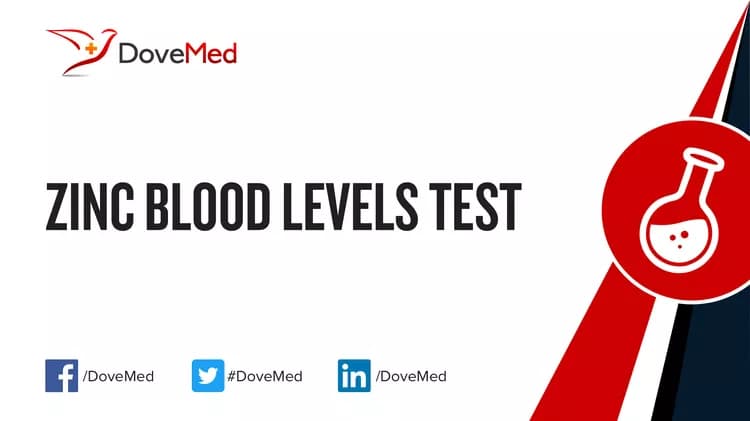What are the other Names for this Test? (Equivalent Terms)
- Zn Blood Test
- Zn2+ Blood Test
What is Zinc Blood Levels Test? (Background Information)
Zinc is a trace mineral found in all bodily tissues, but especially concentrated in the eye, bone, and male reproductive organs. Several important functions of zinc include:
- Making DNA and RNA, which is important to actively dividing cells
- Repairing tissues
- Making collagen
- Making active vitamin A for eye health
- Soaking up harmful heavy metals such as lead and cadmium
- Trace minerals are elements that the body requires in small amounts to function optimally. In contrast to minerals needed in abundance, such as calcium and potassium, the body needs trace minerals, such as zinc, in microgram (µg) to milligram (mg) quantities. The recommended daily allowance (RDA) for zinc is 10 mg. Even though they are not needed in large amounts, trace minerals serve many important functions
- The body takes in zinc through the small intestine. The sites of ingestion and excretion of zinc are the same as those for copper and iron, but unlike these minerals, the body does not store zinc
- Deficiencies in zinc may stem from several causes. An individual may not acquire enough zinc through the diet. Or, he/she may lack the means to absorb zinc or make it available for use
- Excesses zinc, however, may lead to toxicity. This may occur through too much zinc supplementation. Toxicity may also result, if the liver and kidneys are unable to process extra zinc
- The Zinc Blood Levels Test determines the levels of zinc in blood. It is used to diagnose zinc deficiency or toxicity. It is also used to investigate any malabsorptive disorders
What are the Clinical Indications for performing the Zinc Blood Levels Test?
Following are the clinical indications for performing the Zinc Blood Levels Test:
In infants:
- Impaired growth and development
- Diarrhea
- Impaired wound healing
- Frequent infections
In adolescents and adults:
- Impaired sexual development and function
- Weak immune system
- Altered taste and smell
- Emotional instability
- Night vision problems
- Rash
How is the Specimen Collected for Zinc Blood Levels Test?
Following is the specimen collection process for Zinc Blood Levels Test:
Sample required: Blood
Process of obtaining blood sample in adults:
- A band is wrapped around the arm, 3-4 inches above the collection site (superficial vein that lies within the elbow pit)
- The site is cleaned with 70% alcohol in an outward spiral, away from the zone of needle insertion
- The needle cap is removed and is held in line with the vein, pulling the skin tight
- With a small and quick thrust, the vein is penetrated using the needle
- The required amount of blood sample is collected by pulling the plunger of the syringe out slowly
- The wrap band is removed, gauze is placed on the collection site, and the needle is removed
- The blood is immediately transferred into the blood container, which has the appropriate preservative/clot activator/anti-coagulant
- The syringe and the needle are disposed into the appropriate “sharp container” for safe and hygienic disposal
Preparation required: No special preparation is needed prior to the test.
What is the Significance of the Zinc Blood Levels Test Result?
The significance of the Zinc Blood Levels Test result is explained:
High zinc blood levels may indicate:
- Anemia
- Arteriosclerosis
- Coronary heart disease
- Primary osteosarcoma of the bone
Low zinc blood levels may indicate:
- Acrodermatitis enteropathica
- Acute infection
- Acute stress
- Acquired immunodeficiency syndrome (AIDS)
- Burns
- Cirrhosis
- Diabetes
- Long-term total parenteral nutrition
- Malabsorption
- Myocardial infarction (or heart attack)
- Nephrotic syndrome
- Pregnancy
- Pulmonary tuberculosis
The laboratory test results are NOT to be interpreted as results of a "stand-alone" test. The test results have to be interpreted after correlating with suitable clinical findings and additional supplemental tests/information. Your healthcare providers will explain the meaning of your tests results, based on the overall clinical scenario.
Additional and Relevant Useful Information:
- Certain factors influence the results of the Zinc Blood Levels Test and these include diet, stress, and pregnancy
Certain medications that you may be currently taking may influence the outcome of the test. Hence, it is important to inform your healthcare provider of the complete list of medications (including any herbal supplements) you are currently taking. This will help the healthcare provider interpret your test results more accurately and avoid unnecessary chances of a misdiagnosis.
The following DoveMed website links provide more information on trace minerals test:
https://www.dovemed.com/common-procedures/procedures-laboratory/trace-minerals-urine-test/
https://www.dovemed.com/common-procedures/procedures-laboratory/trace-minerals-blood-test/
Please visit our Laboratory Procedures Center for more physician-approved health information:
http://www.dovemed.com/common-procedures/procedures-laboratory/
Related Articles
Test Your Knowledge
Asked by users
Related Centers
Related Specialties
Related Physicians
Related Procedures
Related Resources
Join DoveHubs
and connect with fellow professionals


0 Comments
Please log in to post a comment.